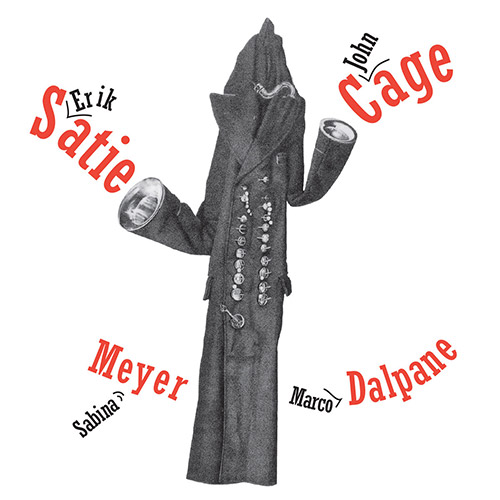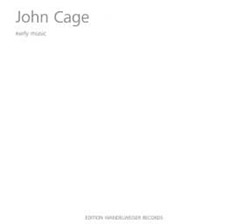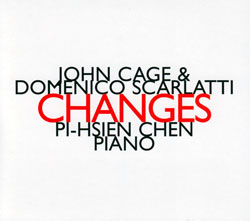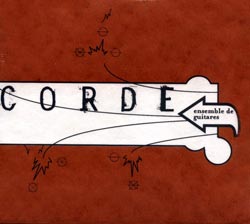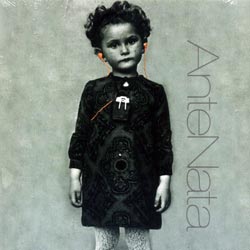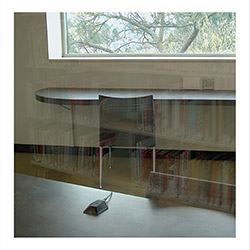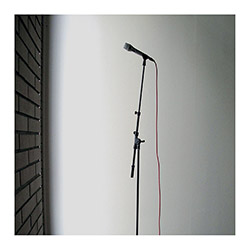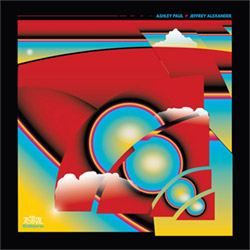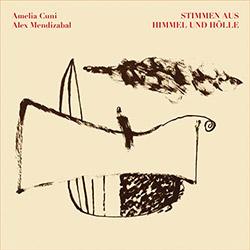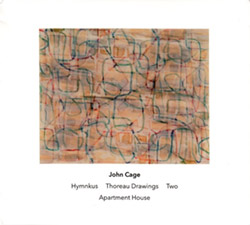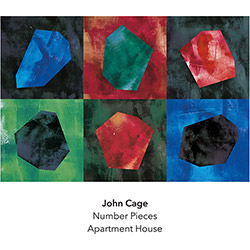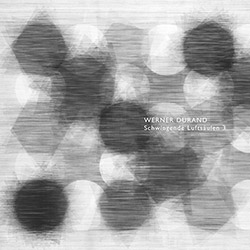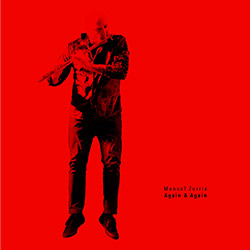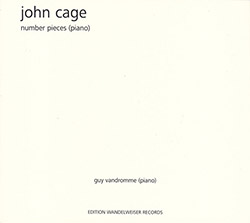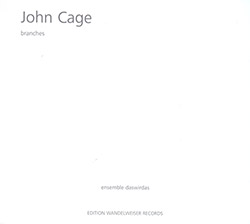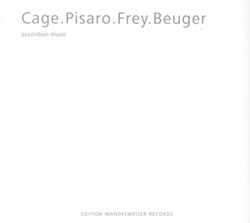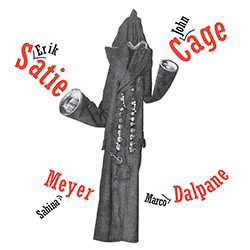
Pianist Marco Dalpane and soprano Sabina Meyer create a virtual cabaret of songs using the music of Erik Satie and John Cage, interlacing pieces by each in a delicate set of songs that draw the two composers together through a surprising commonality, the lyrics provided from texts written by J. Peladan, C. Mendes, H. Pacory, J.P. Contamine de Latour, &c.; lovely.
In Stock
Quantity in Basket: None
Log In to use our Wish List
Shipping Weight: 4.00 units
Sample The Album:
Sabina Meyer-voice, objects
Marco Dalpane-piano
Erik Satie-composer
John Cage-composer
Click an artist name above to see in-stock items for that artist.
Label: ANTS Records
Catalog ID: AG13
Squidco Product Code: 28656
Format: CD
Condition: New
Released: 2007
Country: Italy
Packaging: Jewel Case
Recorded at V38 recording studio, in Rome, Italy, in October, 2004, by Paolo Sinigaglia.
"Erik Satie and John Cage were two musicians of great influence and supreme coherence. In their rigorous path they choose the road to astonishment. On the road to their artistic ideal they met the "music", when others only loosely saw it. Satie and Cage are, now historically, two composers to draw near. And this approach comes from their enormous artistic personality.
Sabina Meyer and Marco Dalpane are musicians of great sensibility and skill and, simply, they catch all these aspects in their performances. Satie comes so near to Cage and Cage "slides" toward Satie. The interlacing of the pieces gives us a path of reconstruction - as they want to show us. In "Cabaret Per Nulla" each piece by Satie piece could be (would be?) written by Cage and viceversa. "Vexations" seems as it comes from the pen of the young Cage, and "In a landscape" "belongs" to Satie, and to all of us. "She is asleep" and "La Diva de L'Empire" are two faces of the same medal. And so on.
This collection not only includes the music of two great modern composers, but in it the performers perfectly represent the community and presence of their efforts and makes the experience of listening so coherent, letting us forget all the differences - Times, Modes, Lifes - and allowing to understand that big, astonishing common element: Art.
From the liner notes of Mario Gamba: "... In terms of a critical analysis Meyer and Dalpane treat these light, amiable and provocative works, of which only Aria (1958) by Cage can evoke the drama one can imagine in the physical and mental/emotional space of a cabaret, with a non-cabaretistic approach. They don't evoke in their music the cabaret because they choose other tones and other moods. Committed, as they are, to the music in a more complex and fundamental way..." "-ANTS
Artist Biographies
• Show Bio for Sabina Meyer "Sabina Meyer is a soprano, vocalist, songwriter and musicologist of Swiss and Italian origins that has made cross-cultural references a key issue in her approach to performing music of the most diverse kind. Contemporary classical music, Antiques arias and new European free improvisation blend seamlessly in a musical sound-scape of her own invention. Works by contemporary composers have been written for her and she has performed Premieres all over Europe. In her repertory she ranges from the Art Songs of Weill, Eisler, Satie to works by contemporary composers such as Berio, Scelsi, Cage. She has composed songs based on the works of female poets and explored avenues in more radical electronic improvisations. Currently she is specializing in the Baroque repertoire performing Monteverdi, Strozzi and Dowland and has developed an approach to recreating Early Music with Electroacoustics touches with a multimedia Opera entitled NINFA IN LAMENTO. She has recorded for Harmony Music, Auditorium, Ambiances Magnétiques, Raitrade, Radio3Suite, Ants, Die Schachtel, Ticonzero, Bolt Records. She has participated at the following FESTIVALS : Isole che parlano Palau 2000, Controindicazioni Roma 2001/2003/2004, Angelica Bologna 2002, RingRing Beograd2002, Interzone Novisad 2002, Musique Innovatrices St. Etienne 2004, Crossroads Bologna 2003, Festival Sant'Arcangelo 2003, Nuova Consonanza Roma 2003/2005, Pulsi Milano 2004, Progetto Musica Roma-L'Aquila 2004, Musica e Scienza Roma 2005, Instabile Europe Contest Imola 2005, Festival Scelsi Roma 2006, AllFrontiers Gorizia 2006, Talos Ruvo di Puglia 2007, Instabili Forme Sonore Roma 2007, Sonora KunstMeran 2008, Neue Musik im Stadthaus Ulm 2008, Biennale Danza Venezia 2008, Mulhouse Festival 2008, Ad Libitum Varsaw 2008, TheThirstyFish_Festival London 2008, Irtijal-Festival Beirut 2009/2010, Internationales Orgel Festival Meran 2009, Festival Perinaldo 2009, Phonomanie IX Ulrichsberg 2009, Adesso Jazz Goethe-Institut Rom 2009, Be Music-Night Parco della Musica Roma 2010, DoubleDouble Stockholm 2010, Crossroads Bologna 2010, SWISSNEX San Francisco & CNMAT University of California Berkeley2011, Fondazione Isabella Scelsi Roma 2011, Museo Marini Firenze 2012, Biennale Architettura Venezia 2012 (Special Mention), Festival Internazionale di organo e strumenti antichi Orte 2012, Florens Firenze 2012, Atelierhaus Berlin 2012, Maison 44 Basel 2013, Radialsystem Berlin 2013, VII. Biennale Alter Musik Berlin 2014, Exploratorium Berlin 2012/2014, Roma Europa Festival Rom 2014/2016, Schweizer Institut ISR Rom 2014. She graduated 1994 summa cum laude in Anthropology and Musicology at University of Bologna in Italy. She has studied classical vocal technique with Delia Surrat and has prepared her contemporary repertoire with Michiko Hirayama. She has also participated in masterclasses held by Rinaldo Alessandrini about Baroque repertoire. She teaches at the Giacomo Puccini Conservatoire in Pesaro and at the Benedetto Marcello Conservatoire in Venice." ^ Hide Bio for Sabina Meyer • Show Bio for Marco Dalpane "Marco Dalpane was born and lives in Bologna. Studied piano, composition and electronic music. Performed in concerts as a soloist and in various chamber music ensembles, focusing primarily on 20th century music. His repertoire includes works by Liszt, Debussy, Ravel, Satie, Schoenberg, Webern, Bartok, Hindemith, Messiaen, Cowell, Gershwin, Cage, Stockhausen, Feldman, Brown, Guaccero, Bussotti, Castaldi, Cardew, White, Skempton, Glass, Curran, Riley, Reich, Nyman, Adams, Johnson, Bryars, Ten Holt, Otte, Oliveros, Muhly. Formed several musical groups oriented towards a fusion of minimalist, jazz and rock styles. Amongst other recordings, two CDs for Virgin-Stile Libero. Has carried out projects involving musicians coming from extra-academic areas such as Tony Coe, Lindsay Cooper, Paolo Fresu, Enrico Rava, Fred Frith, Butch Morris, Eyvind Kang, Alvin Curran, Ulrich Krieger. Has composed scores for theater, dance and films, art exhibitions, readings, CD-Roms and DVDs (Storia tecnologica del cinema, Treccani). Plays accordion in the Vladah Klezmer Band. Since 1991, has been working on music for silent as a pianist, composer and conductor. Has composed commissioned pieces for some of the main European television networks such as ZDF and ARTE. Has provided live musical accompaniment at more than 800 film viewings, including some of the leading international music and film festivals in France, Switzerland, Spain, Germany, Hungary, Belgium, Luxembourg, Slovenia, Serbia, USA, Colombia, Japan, South Korea. From 1991 to 2012 he collaborated with the Cineteca del Comune di Bologna." ^ Hide Bio for Marco Dalpane • Show Bio for Erik Satie "Erik Satie, original name in full Eric Alfred Leslie Satie, (born May 17, 1866, Honfleur, Calvados, France-died July 1, 1925, Paris), French composer whose spare, unconventional, often witty style exerted a major influence on 20th-century music, particularly in France. Satie studied at the Paris Conservatory, dropped out, and later worked as a café pianist. About 1890 he became associated with the Rosicrucian movement and wrote several works under its influence, notably the Messe des pauvres (composed 1895; Mass of the Poor). In 1893, when he was 27, Satie had a stormy affair with the painter Suzanne Valadon. From 1898 he lived alone in Arcueil, a Paris suburb, cultivating an eccentric mode of life and permitting no one to enter his apartment. Beginning in 1905, he studied at the Schola Cantorum under Vincent d'Indy and Albert Roussel for three years. About 1917 the group of young composers known as Les Six adopted him as their patron saint. Later the School of Arcueil, a group including Darius Milhaud, Henri Sauguet, and Roger Désormiere, was formed in his honour. Satie's music represents the first definite break with 19th-century French Romanticism; it also stands in opposition to the works of composer Claude Debussy. Closely allied to the Dada and Surrealist movements in art, it refuses to become involved with grandiose sentiment or transcendent significance, disregards traditional forms and tonal structures, and characteristically takes the form of parody, with flippant titles, such as Trois morceaux en forme de poire (1903; Three Pieces in the Shape of a Pear) and Embryons Desséchés (1913; Desiccated Embryos), and directions to the player such as "with much illness" or "light as an egg," meant to mock works such as Debussy's preludes. Satie's flippancy and eccentricity, an intimate part of his musical aesthetic, epitomized the avant-garde ideal of a fusion of art and life into an often startling but unified personality. He sought to strip pretentiousness and sentimentality from music and thereby reveal an austere essence. This desire is reflected in piano pieces such as Trois Gnossiennes (1890), notated without bar lines or key signatures. Other early piano pieces, such as Trois Sarabandes (1887) and Trois Gymnopédies (1888), use then-novel chords that reveal him as a pioneer in harmony. His ballet Parade (1917; choreographed by Léonide Massine, scenario by Jean Cocteau, stage design and costumes by Pablo Picasso) was scored for typewriters, sirens, airplane propellers, ticker tape, and a lottery wheel and anticipated the use of jazz materials by Igor Stravinsky and others. The word Surrealism was used for the first time in Guillaume Apollinaire's program notes for Parade. Satie's masterpiece, Socrate for four sopranos and chamber orchestra (1918), is based on the dialogues of Plato. His last, completely serious piano works are the five Nocturnes (1919). Satie's ballet Relâche (1924) contains a Surrealistic film sequence by René Clair; the film score Entr'acte, or Cinéma, serves as an example of his ideal background, or "furniture," music. Satie was dismissed as a charlatan by musicians who misunderstood his irreverence and wit. They also deplored the nonmusical influences in his life-during his last 10 years his best friends were painters, many of whom he had met while a café pianist. Satie was nonetheless deeply admired by composers of the rank of Darius Milhaud, Maurice Ravel, and, in particular, Claude Debussy-of whom he was an intimate friend for close to 30 years. His influence on French composers of the early 20th century and on the later school of Neoclassicism was profound." ^ Hide Bio for Erik Satie • Show Bio for John Cage "John Milton Cage Jr. (September 5, 1912 - August 12, 1992) was an American composer, music theorist, writer, philosopher, and artist. A pioneer of indeterminacy in music, electroacoustic music, and non-standard use of musical instruments, Cage was one of the leading figures of the post-war avant-garde. Critics have lauded him as one of the most influential American composers of the 20th century. He was also instrumental in the development of modern dance, mostly through his association with choreographer Merce Cunningham, who was also Cage's romantic partner for most of their lives. Cage is perhaps best known for his 1952 composition 4′33″, which is performed in the absence of deliberate sound; musicians who present the work do nothing aside from being present for the duration specified by the title. The content of the composition is not "four minutes and 33 seconds of silence," as is often assumed, but rather the sounds of the environment heard by the audience during performance. The work's challenge to assumed definitions about musicianship and musical experience made it a popular and controversial topic both in musicology and the broader aesthetics of art and performance. Cage was also a pioneer of the prepared piano (a piano with its sound altered by objects placed between or on its strings or hammers), for which he wrote numerous dance-related works and a few concert pieces. The best known of these is Sonatas and Interludes (1946-48). His teachers included Henry Cowell (1933) and Arnold Schoenberg (1933-35), both known for their radical innovations in music, but Cage's major influences lay in various East and South Asian cultures. Through his studies of Indian philosophy and Zen Buddhism in the late 1940s, Cage came to the idea of aleatoric or chance-controlled music, which he started composing in 1951. The I Ching, an ancient Chinese classic text on changing events, became Cage's standard composition tool for the rest of his life. In a 1957 lecture, Experimental Music, he described music as "a purposeless play" which is "an affirmation of life - not an attempt to bring order out of chaos nor to suggest improvements in creation, but simply a way of waking up to the very life we're living"." ^ Hide Bio for John Cage
4/22/2024
Have a better biography or biography source? Please Contact Us so that we can update this biography.
4/22/2024
Have a better biography or biography source? Please Contact Us so that we can update this biography.
4/22/2024
Have a better biography or biography source? Please Contact Us so that we can update this biography.
4/22/2024
Have a better biography or biography source? Please Contact Us so that we can update this biography.
Track Listing:
1. She Is Asleep 07:50
2. La Diva De "L'empire" 02:56
3. Trois Poemes D'amour, N. 1 00:46
4. Trois Poemes D'amour, N. 2 00:42
5. Trois Poemes D'amour, N. 3 00:48
6. Vexations 01:29
7. The Wonderful Widow Of Eighteen Springs 02:13
8. Salut Drapeau 04:07
9. Chanson, Op. 52 01:15
10. Chanson Medieval 01:29
11. Les Fleurs 01:31
12. Je Te Veux 03:43
13. In A Landscape 08:05
14. Aria 10:03
15. Les Anges 01:47
16. Elegie, Op. 19 02:31
17. Sylvie 02:17
Compositional Forms
Avant-Garde
Duo Recordings
Piano & Keyboards
Unusual Vocal Forms
John Cage
Song Based Music
New in Compositional Music
Search for other titles on the label:
ANTS Records.


